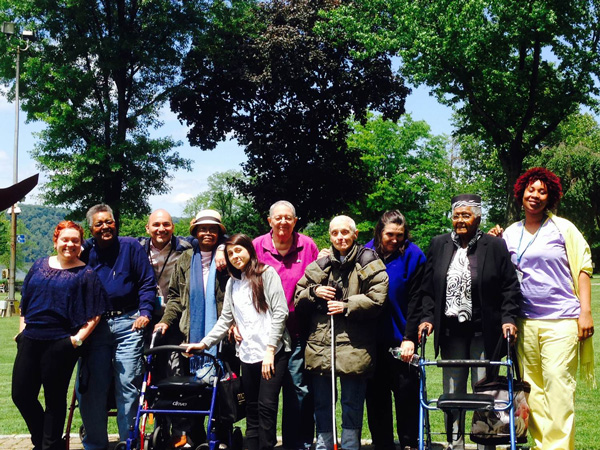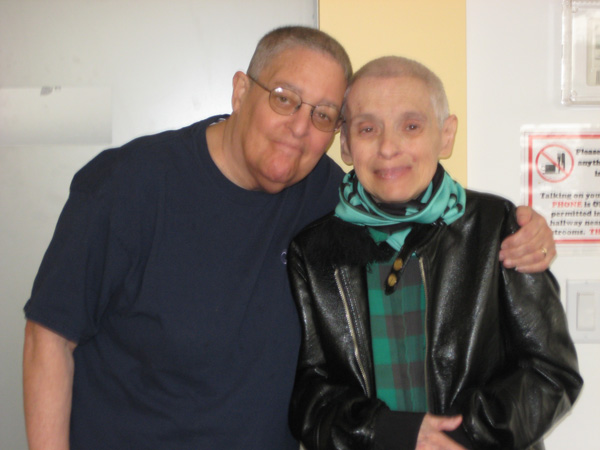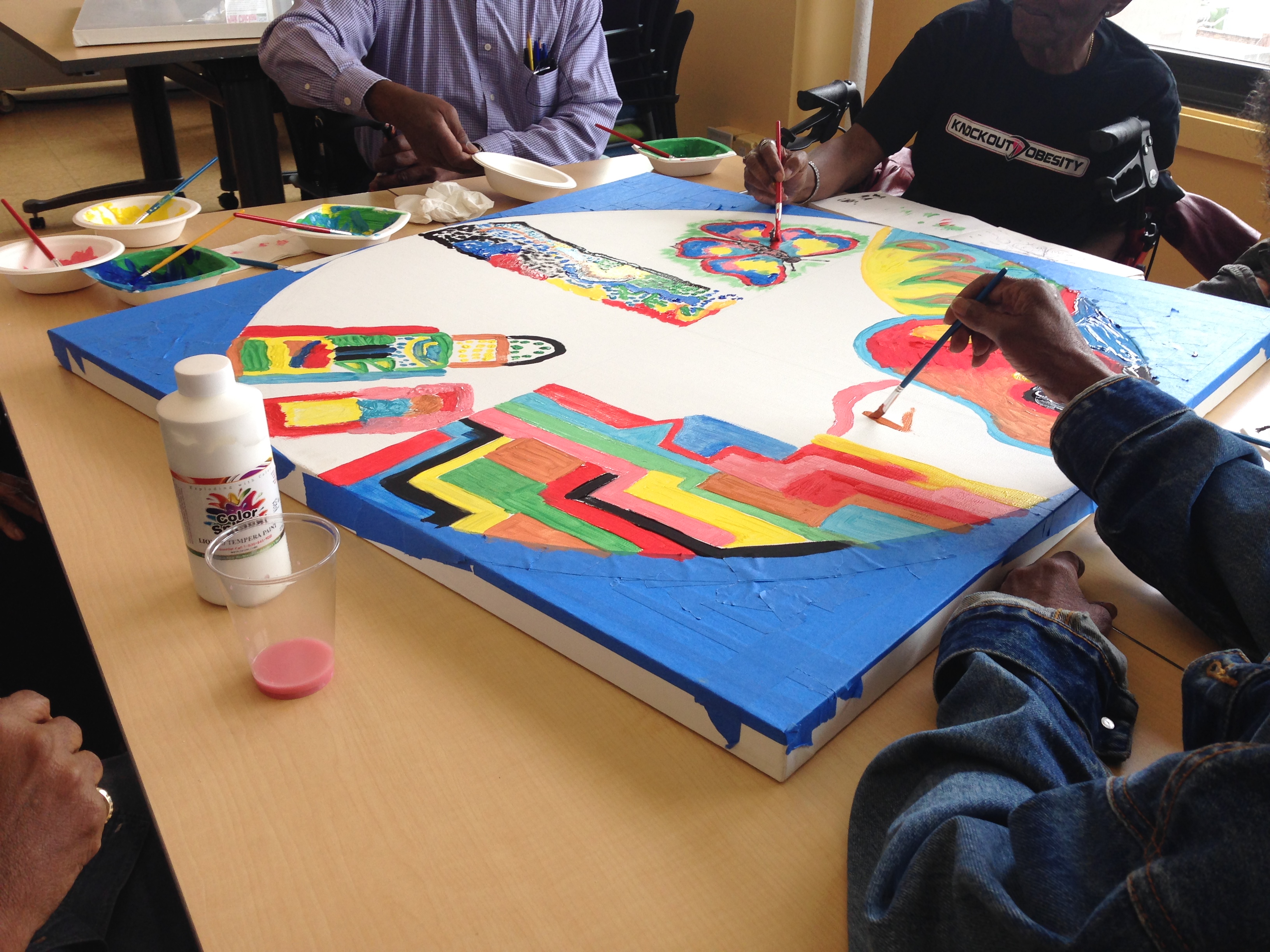
BY DUSICA SUE MALESEVIC | Barbara Police and Pat Slone have been together for 40 years and have a problem that many couples can relate to — temperature wars.
Police is always cold, explained Slone, “and I am always hot.” This can play itself out in windows opening and then closing, she noted.
But Police, 66, and Slone, 72, can agree on many things — their love for “Law & Order: Special Victims Unit,” for instance.
“We watch it for Mariska Hargitay,” said Police, referring to the actress who plays Olivia Benson. The couple named their dog Munchy after John Munch, a character from the show.
Also at the top of their list is the new day program that is part of SAGE, which stands for Services & Advocacy for Gay, Lesbian, Bisexual & Transgender Elders. The organization has been addressing older LGBT adult issues since 1978.
“We like the program very much,” said Police. “We have different things that we do each day — discussion, trivia, painting, dance [and] exercise. We have a lot of things that we do. We enjoy it.”

SAGEDay was launched last November in partnership with the Hebrew Home at Riverdale. It is a social adult day program for LGBT elders who may have one or more limitations (cognitive or mobility issues, for example).
Door to door transportation is provided, explained Scott Randall, outreach manager for the program, as he gave Chelsea Now a tour of the facilities that include a library, lounge and cyber center at the SAGE Center. In 2012, the SAGE Center opened at 305 Seventh Ave. (btw. 27th and 28th Sts.) and activities for the program are housed on the sixth and 15th floors.
Participants are provided with a light breakfast, full lunch and a light snack, said Randall. The program (Mon.–Fri. 9 a.m.–5 p.m.) offers support and structure, he said.
There is an admission process, explained program manager Doreen Bermudez, after which each person is assessed and an individualized care plan is created.
Activities are tailored for the participants, many of whom have memory loss. There are art workshops, storytelling sessions, games such dominoes, Trivial Pursuit and chess, as well as karaoke, said Randall. They also go on outings, most recently to the Frida Kahlo exhibit at the New York Botanical Garden.
The social program aims “to enhance and maintain the quality of life” of participants, said Bermudez.
“We are able to provide an environment that is safe and inclusive to LGBT [elders] and also address those unique needs,” she said.
Older LGBT adults face singular issues — access to healthcare, inequality under the law, housing and isolation, said Bermudez.
“We are trying to break isolation, and we are also building community with the older adults that are in the program that necessary might not have a network of support,” said Bermudez, who noted some are estranged from their family.
Affordable housing and housing discrimination are also problems older LGBT adults face, said Cathy Renna, managing partner at TargetCue, a firm that provides public relations and marketing for LGBT and HIV/AIDS organizations.
“They will find themselves in situations where, as they age, finding housing that adequately addresses their needs is difficult. LGBT elders often experience discrimination in situations like nursing homes and assisted care facilities,” said Renna, a LGBT activist for 25 years, in a phone interview.
“There are many examples of couples who’ve been split apart or individuals who kind of have to get back in the closet because there’s a homophobic environment,” she added.
Since 2006, SAGE has been at the forefront of giving LGBT aging issues both a local and national platform, said Bermudez.
Renna said that there has been a sea change in activism, advocacy and attitudes around aging issues within the community and outside of it.
“Within our own community — the LGBT community needed to deal with its own ageism,” she said. “If you look at LGBT media and the LGBT community in general in terms of visibility, you rarely saw older LGBT people. SAGE has been instrumental in increasing the visibility of LGBT Americans within our own community as well as the larger community.”
SAGE has centers throughout the city and 27 affiliates in 20 states and the District of Columbia.
The SAGEDay program is currently funded by a grant from the New York State Department of Health and has the capacity for 25 people, said Randall. As of now, around 10 people regularly attend, he said.

At the end of September, funding will end and participants will be covered if they have Medicaid or are eligible for Medicaid. If not, the program costs $65 a day and $35 a day for transportation if needed, said Randall.
Police and Slone don’t live so far from the SAGE Center as they reside at VISIONS at Selis Manor (135 23rd St. btw. Sixth & Seventh Aves).
Police grew up in the Village, and is not a raving fan of Chelsea — she remembers, as a child, being forbidden to go above 14th St. Slone grew up near Yankee Stadium in the Bronx, and can remember its light flooding her windows at night.
Both have been a part of SAGE for over 32 years, from the time when it was just a handful of people in Greenwich Village, where the organization first laid down roots.
The couple met in the lunchroom at their workplace.
“I was talking to a friend and I banged my tray into hers,” explained Slone, “and she turned around and I said, ‘Hello there’ and she said, ‘Well, hello there.’ ”
The rest, as they say, is history.
For more information on SAGE programs and services, call 212-741-2247 or visit sageusa.org.
































